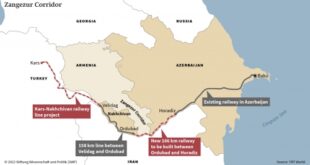- Reports indicate the emergence of another private military company (PMC) in Russia established by Gazprom, the majority government-owned energy giant and conglomerate.
- With mercenaryism generally illegal in Russia, the organizations like Wagner clearly exist at the pleasure of Russian President Putin and rely on relationships among leaders for their legalization.
- The announcement raises questions over the purpose and scope of the Gazprom PMC, as well as whether it can circumscribe the influence and possible political ambitions of Wagner leader Yevgeny Prigozhin.
- Groups like Wagner have in many ways operated symbiotically with Moscow, paving the way through their private security work for the state to exert greater influence. Might Gazprom’s PMC be an indicator of Moscow’s intentions?
The Russian private military company (PMC) known as the Wagner Group has been associated with a trail of brutal violence in Ukraine and several African states over the past few years. However, reports now indicate that another PMC – established by Gazprom, the majority-government owned energy giant and conglomerate – has emerged in Russia. Although Wagner’s ultimate role and impact in Syria has reportedly been negligible, it has served as an arm of Russian influence in the Central African Republic, Mozambique, Mali, and now most likely Burkina Faso. It has also reportedly enriched Moscow’s coffers by accepting payments in commodities and access to resources, bypassing international sanctions measures. Having displaced French counterterrorism forces in the Sahel, Wagner has become the Malian junta’s preferred partner to address the region’s tide of jihadist violence. However, Wagner’s associations with brutal campaigns of rape and killing, including the massacre at Moura, may not long quiet the grievances of citizens frustrated with the government’s inability to prove long-term security or stability. Moreover, Wagner has been associated with a campaign of disinformation to discredit France, the former colonial power in the region, and fuel local dissatisfaction with their role in regional security. In November 2022 French President Emmanuel Macron accused Russia of pursuing a “predatory project” in Africa by pushing disinformation into African countries, “a political project financed by Russia, sometimes others.”
Although Wagner is a private organization, its close linkages to Russian President Vladimir Putin have made it widely perceived as an extension of the formal state. Yevgeny Prigozhin, Wagner’s founder, has had a longstanding close relationship with Putin, earning the nickname “Putin’s chef” for his catering businesses that often took in government contracts, which likely explains how he received permission to operate a PMC despite mercenaryism being illegal in Russia. As such, the legal existence of organizations like PMC Wagner depends largely on the pleasure of the Russian president. Moreover, Prigozhin’s ambitions extend beyond the delivery of culinary services, with Wagner forces providing important manpower and capacity in Ukraine. His confidence in his forces has been reflected in his public disagreements with the Russian defense leadership’s management of the war and his support for General Surovikin, who was appointed to run Russia’s campaign for three months in October. Putin’s subsequent re-appointment of General Valery Gerasimov to lead the war effort despite Prigozhin’s opposition may offer some indication of trouble in the relationship.
The announcement of a new PMC established by Gazprom raises questions about the purpose and scope of the new organization. As with Wagner and the private military organization established by Chechen strongman Ramzan Kadyrov, it is unthinkable that permission to establish such an organization could be given without support from the very top of the Russian leadership and a close relationship between Putin and Gazprom head Alexei Miller. However, given that the Russian government exerts direct majority ownership over the company, the government will have less plausible deniability when it comes to the activities of this new PMC than it does with Wagner. Only recently have Prigozhin and members of the Russian government even acknowledged the existence of Wagner. One possibility is that establishing a Gazprom PMC may help circumscribe Prigozhin’s influence and possible political ambitions. The reappointment of Gerasimov over Prigozhin’s favored general may be another indicator of this rationale. For Gazprom’s leadership, this PMC might offer a way to ingratiate themselves with a political leader now primarily focused on securing a military victory in Ukraine, though it begs the question of whether this is the best use of government resources that might otherwise be spent on the armed forces fighting on the frontlines, though it could also be seen as diverting resources from commercial extraction to boosting military resources.
Already beset with struggles on the frontlines, and having to rely on poor equipment, tactics, and a newly mobilized force whose commitment to occupying Ukraine may be questionable, the emergence of yet another PMC raises issues of force integration and command and control. While Ukraine would likely welcome news of further intra-force tensions among Russian groups, such tensions may also fuel more brutal Russian campaigns unconstrained by concerns about states’ responsibilities or international law, though such considerations already appear absent on the frontlines of Ukraine. Evidence of foreign fighters in conflicts such as Syria’s show how the entry of foreigners can make conflicts more violent and intractable. Where Wagner has accepted access to natural resources or commodities as payment to avoid sanctions, the establishment of a Gazprom PMC will also raise questions about how it will manage its finances when several Gazprom-related entities face sanctions.
What might Gazprom’s PMC be able to achieve, and where might it be deployed, given that Wagner has not yet proven itself able to deliver outright victory over opposing forces in either the Sahel or Ukraine? Prigozhin’s organization, while initially denied by the state, has in many ways operated symbiotically with Moscow’s leaders, paving the way through their private security work for the state to exert greater influence. The visit of Russian foreign minister Sergey Lavrov to Mali recently is one example. Gazprom, owned in large part by the state and operating multiple entities with legitimate business operations in several countries, will have a different profile on the field. Besides protecting Gazprom enterprises and personnel, the purpose and placement of its new PMC may offer some clue into Moscow’s thinking regarding the future and the relationships between President Putin and members of his inner circle.
 Eurasia Press & News
Eurasia Press & News



